Thomas Paine, The Pen Behind The American Revolution
“Without the pen of Paine, the sword of Washington would have been wielded in vain.” ― John Adams
Who was Thomas Paine?
All lives are valuable and have purpose. Some people live regular lives. Have a career, maybe get married, raise a family and live a fulfilled life that way. Some people live extraordinary lives. Are talented artists, musicians, scientists, doctors, athletes, etc., and perform great feats. Some people have great tragedies or failures and overcome them. Or not. And some people are shooting stars. Maybe a life of tragedy or failure and then, something somehow changes. Some circumstance where they rise to the occasion and hit the grand slam to do something truly exceptional. That was the life of Thomas Paine.
He was born Thomas Pain January 29, 1737, in Thetford, Norfolk, England. He added the “e” in 1769. His father was Quaker and his mother Anglican. He left school at 13 to apprentice under his father as a corset maker. There is an opinion that because of that he only got a rudimentary education which I disagree with. Being in school that long at that time would have made him prepared for life with a thorough knowledge of personal finances, a familiarity with the great minds of history, etc. More prepared for life than most of our college graduates today. He even taught school as one of his many occupations. Then consider Benjamin Franklin only had two years of formal schooling when he left to apprentice as a printer and George Washington none at all! Self-education was common at the time and Paine, even on his low paying Customs Inspector job, bought books and scientific apparatus to further educate himself.
He tried various occupations. At 19 he was even briefly a sailor on the ship of a privateer.
A privately owned armed vessel commissioned by a belligerent state to attack enemy ships, usually vessels of commerce.
Privateers were commissioned by a specific government and could only attack ships that fly under an enemy flag, while pirates were not sanctioned by any government and attacked whomever they wanted. Crews were paid with a portion of the goods they seized. The seized ships and the rest of the cargo went to the country who commissioned them.
America's original navy were mostly privateers, with armed ships big and equipped enough to actually fight the British Navy, organized by Washington but not commissioned by the Congress, so technically, they were pirates! They played a large part in the Revolution. More on that in a future post.
He was a privateer till 1759 when he returned to Britain to set up a shop as a master corset maker in Sandwich, Kent. He married his first wife Mary Lambert on September 27, 1759. Shortly afterward, Mary became pregnant, and she and the baby died during childbirth the following year. In 1761, Paine became what we would today call a temp working in government bureaucracy. In 1762, he became a Customs Excise Tax Collector. He married his second wife Elizabeth Ollive in 1771 whose recently deceased father was a grocer and tobacconist which was the next occupation he entered with his wife. In 1772, he published a detailed argument that a raise in pay was the only way to end corruption in the Customs Collector position and was fired. By 1774 he was at the end of his rope. The shop failed. His marriage ended. He sold all his possessions to stay out of debtor's prison. Through a mention in conversation by a friend, mathematician George Lewis Scott, he was introduced to Benjamin Franklin. A meeting was arranged, and Franklin advised Paine to go to America and gave him letters of recommendation. One to Franklin’s son-in-law, Richard Bache.
Paine comes to the colonies
Paine arrived in Philadelphia on November 30, 1774, barely alive because the ship's water supply was contaminated, and typhoid fever killed at least five passengers. He was physically carried off the ship and nursed back to healthy by Benjamin Franklin's personal physician. Franklin's son in law introduced him to Robert Aitkin. The two founded the Pennsylvania Magazine which Paine edited for 18 months. Paine himself published numerous articles and some poetry, anonymously or under pseudonyms. One, “African Slavery in America”, a scathing attack on the American slave trade, is credited by many to Paine. However, according to THE THOMAS PAINE NATIONAL HISTORICAL SOCIETY, which I agree with based on evidence, he did not. For one example, the author uses religious references to oppose slavery, with many Christian references. Paine had an aversion and distrust of established religions. He would have opposed it that natural law prohibits one human being from owning another. The conclusion is it was most probably written by Samuel Hopkins, a Christian preacher in Rhode Island.
All the while, Paine was observing events around him regarding relations with, and injustices committed, by England. Including the attempted disarmament of colonists which resulted in the battles of Lexington and Concord, April 19, 1775. Paine reasoned that the cause of America should be not just a revolt against taxation, but part ways with England and a monarchy altogether, and become an independent nation. Paine wrote a series of letters under the title of Plain Truth that would be farmed out to various papers in the city. Dr. Benjamin Rush, one of the signers on the Declaration of Independence, suggested the title Common Sense. Rush arranged a deal with Philadelphia printer and publisher Robert Bell. Common Sense was first printed on January 10, 1776. The 50-page pamphlet sold more than 500,000 copies within a few months. Considering the population was then about 2.5 million, in numbers today that would translate to about 60,000,000 copies. Others including John Adams had previously argued for American independence. It was Paine’s genius that explained it in a way everyone could understand and get behind. The Declaration and Constitution are masterpieces of history. However, without Thomas Paine's unique gift to explain the why and how and light a fire under people, we most likely would not be here today.
There is even possible evidence that Paine had something to do with the drafting of the Declaration of Independence. Several authors have speculated this over the years. There were several working drafts of the Declaration. John Adam's job was to take the drafts and rewrite them as they progressed to a final copy to be submitted to the Congress. One draft was called “the Sherman Copy” submitted to Roger Sherman, which is in the Adams' Family Papers. An inscription on the back reads, "A beginning perhaps-Original with Jefferson-Copied from Original with T.P.'s permission." The Thomas Paine National Historical Association claims this is proof Paine was involved in the drafting.
Paine’s words were read with the power, drama, and vindictiveness, that emanated from the man himself, one who would struggle to harness that spirit at other times in his life.
“There is something very absurd in supposing a continent to be perpetually governed by an island,” he insisted. As to the colonies’ dependence on England, “We may as well assert that because a child has thrived upon milk, that it is never to have meat.” And hereditary monarchy? “Nature disapproves it, otherwise she would not so frequently turn it into ridicule by giving mankind an ass for a lion.”
People read it out loud on street corners. They discussed it in the market, at the taverns and even among church congregations. It is no exaggeration to say Paine laid the groundwork for acceptance of the Declaration of Independence.
Paine never got his copyright on the work. He wanted Common Sense to be freely distributed as far as possible. He never received any of the profits, especially from that initial printing in Bell’s paper. His first step toward self-destruction was to accuse Bell of making a profit which was proven false.
The pamphlet can be broken down into four main sections; origin and design of government based on the English Constitution, monarch and hereditary succession, thoughts on the current state of American affairs, and the present ability of America, paraphrasing the language used by Paine himself.
From “Common Sense”:
“The cause of America is in a great measure the cause of all mankind” was its astonishing and inspiring claim about the fate of thirteen infant colonies on the edge of the world. “The sun never shone on a cause of greater worth. ’Tis not the affair of a city, a county, a province, or a kingdom; but of a continent—of at least one-eighth part of the habitable globe. ’Tis not the concern of a day, a year, or an age; posterity are virtually involved in the contest, and will be more or less affected, even to the end of time, by the proceedings now.”
It was received with astonishment and since it was initially written anonymously, there was great speculation as to who was the author. Some thought Benjamin Franklin.
“These are the times that try men’s souls”
Paine served as volunteer aide-de-camp to Gen. Nathanael Greene. The war for independence was going badly. Washington's army was in retreat. General Howe had offered pardons to local residents, and on Jan. 1, unless they re- enlisted, the army was free to go home. During this time, Paine rose to the occasion and authored 16 “Crisis” papers issued between 1776 and 1783, each one signed Common Sense. “The American Crisis. Number I,” published on December 19, 1776. One of the most inspiring documents in American history:
These are the times that try men’s souls. The summer soldier and the sunshine patriot will, in this crisis, shrink from the service of his country; but he that stands it now deserves the love and thanks of man and woman. Tyranny, like hell, is not easily conquered; yet we have this consolation with us—that the harder the conflict, the more glorious the triumph. What we obtain too cheap, we esteem too lightly: It is dearness only that gives everything its value. Heaven knows how to put a proper price upon its goods; and it would be strange indeed if so celestial an article as freedom should not be highly rated. Britain, with an army to enforce her tyranny, has declared that she has a right not only to tax but “to bind us in all cases whatsoever,” and if being bound in that manner is not slavery, then is there not such a thing as slavery upon earth. Even the expression is impious, for so unlimited a power can belong only to God.
A despondent George Washington was so moved he had Paine’s words read out loud to his troops at McConkey’s Ferry on the Delaware River. They adopted the motto “Victory or Death,” crossed the Delaware in a blizzard, marched all night, some with no boots while some froze to death, and defeated the Hessians at Trenton to turn the tide of the war.
When It Looks Like You Are Screwed...
Starve, dissolve or disperse. It was the gauntlet thrown. How low Washington and his army had fallen in a mere 12 months. Note: The issues I mentioned when I first published this still exist and have only gotten worse. In addition, we now hav…
Paine returns to England, (with a death wish?)
In 1787, Paine returned to London and became engrossed with the French Revolution. In 1791, he wrote his second great work, “Rights of Man”, part 1, in support of the French Revolution against Edmond Burke's attack of it. It was 90,000 words long and shredded the rights of monarchies and other traditional governments that did not look out for the rights of their people saying revolution was justified.
Of course, he eventually had to flee or be arrested and since he safely couldn't cross the Atlantic, went to France. The book was published in England and sold around a million copies, with the printers and book sellers being imprisoned. In 1792 before fleeing to France, he wrote “Rights of Man, Part the Second,” his greatest statement of political principles. He explained and insisted on natural rights, equality, and popular sovereignty. While in France, since he held the view Louis XIV shouldn't be killed but sent to America to learn how to govern, he was arrested and jailed in 1793. He watched daily as other prisoners were taken and executed, about 1,600 to be exact. James Monroe tried to get him released but failed. Finally, after ten months, he was freed but mostly an invalid. He had typhus, gout, recurring fevers, and a suppurating wound on his belly, and never fully recovered. He stayed with Monroe and others till President Jefferson allowed him back in America in 1802.
“The Age of Reason”, the book that made Paine a pariah
In 1793 in France before he was arrested, Paine began writing “The Age of Reason”. It was first published in 1794 and 1795. There is a Part I and a Part II. When he came back to America in 1802, Thomas Jefferson advised him against further printing. He didn’t listen.
All national institutions of churches, whether Jewish, Christian, or Turkish, appear to me no other than human inventions, set up to terrify and enslave mankind, and monopolize power and profit. - Thomas Paine
Paine was accused of being a heretic and atheist, although he actually did believe in God:
I believe in one God, and no more; and I hope for happiness beyond this life. I believe in the equality of man; and I believe that religious duties consist in doing justice, loving mercy, and endeavouring to make our fellow-creatures happy. But . . . I do not believe in the creed professed by the Jewish Church, by the Roman Church, by the Greek Church, by the Turkish Church, by the Protestant Church, nor by any church that I know of. My own mind is my own church.
Old friends wrote him off:
Do you think that your pen, or the pen of any other man, can unchristianize the mass of our citizens? - Samuel Adams
He even wrote an open letter attacking Washington!
Paine was furious that Washington had done nothing to get him out of French prison during the Terror and accused Washington of using his presidency to enrich himself and his allies at the expense of his former veterans and the country at large. Paine even questioned Washington's military leadership in the American Revolution, claiming American victory was due to France, and to other commanders.
Who was Thomas Paine the man?
It was said Paine was rough and unpolished—and a mean drunk. John Adams thought Paine rude, crude, etc., and eventually grew to hate him. However, in all fairness he acknowledged his contribution to American independence in the subtitle quote I used from him. He also wrote this in 1805:
“I know not whether any man in the world has had more influence on its inhabitants or affairs for the last thirty years than Tom Paine,” Adams admitted, adding, with irony worthy of the author of “Common Sense,” “Call it then the Age of Paine.”
Some historians have theorized Paine had a depression problem or maybe was even was bipolar. A tortured soul with the writing genius to motivate the creation of America. On June 8, 1809,
as the seventy-two-year-old Paine lay dying in a house in Greenwich Village, his doctor pressed him, “Do you wish to believe that Jesus Christ is the Son of God?” Paine paused, then whispered, “I have no wish to believe on that subject.”
President Thomas Jefferson wrote about the Paine in 1821:
“No writer has exceeded Paine in ease and familiarity of style, in perspicuity of expression, happiness of elucidation, and in simple and unassuming language,” Jefferson said. “In this he may be compared with Dr. Franklin; and indeed his Common Sense was, for a while, believed to have been written by Dr. Franklin, and published under the borrowed name of Paine, who had come over with him from England.”
It was estimated there were 12,000 people at Benjamin Franklin's funeral. There were maybe six at Paine's.
The man who primed the people for the Declaration of Independence and wrote something so stirring it convinced the troops to reenlist and with Washington's leadership at Valley Forge turn the tide from losing the war of independence to victory, ended his life in such a sorry state. How about that?
The rock group, Bad Company, in 1975 included a song on their Straight Shooter album written by the lead singer Paul Rodgers called Shooting Star. It is about a rock star named Johnny who finally made it and then died in his bed from an overdose of whiskey and sleeping pills. Flying so high then crashing so tragically. Regarding the man who most undoubtedly made the American Revolution and the success of the war for independence reality, the chorus is certainly applicable to the life of Thomas Paine:
Don't you know that you are a shooting star
Don't you know, don't you know
Don't you know that you are a shooting star
And all the world will love you just as long
As long as you are


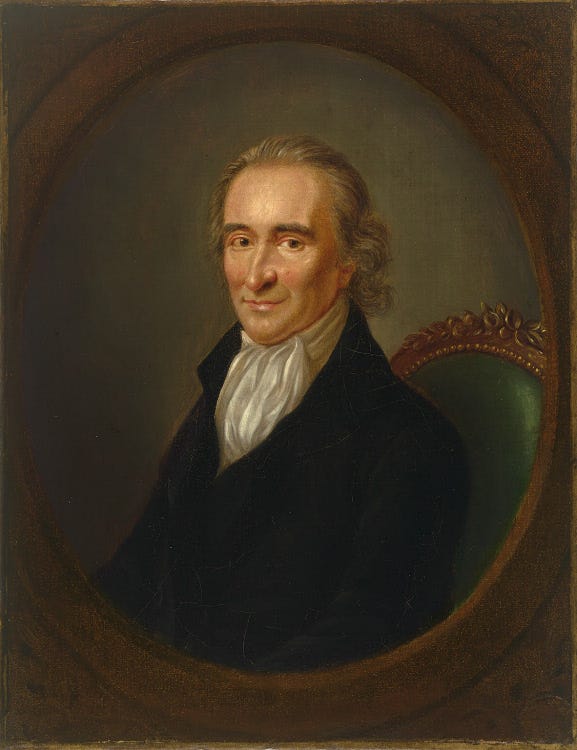
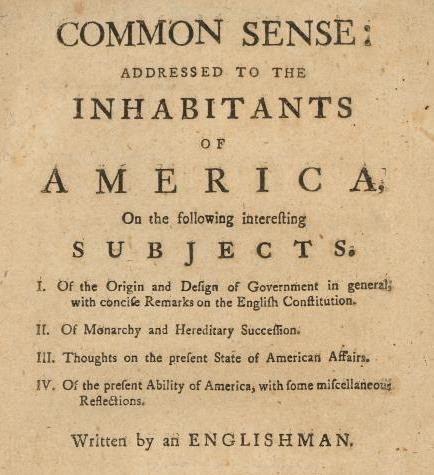
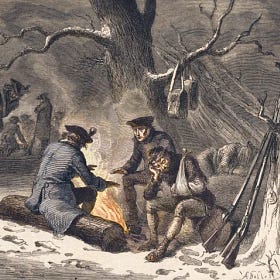
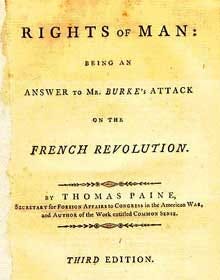
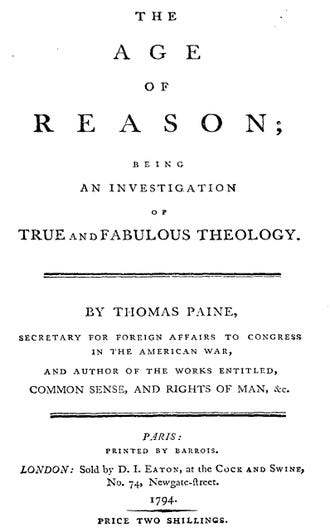
“A thousand years hence perhaps in less, America may be what Europe is now. The innocence of her character, that won the hearts of all nations in her favor, may sound like a romance and her inimitable virtues as if it had never been. The ruin of that liberty which thousands bled for or struggled to obtain may just furnish materials for a village tale or extort a sigh from rustic sensibility, while the fashionable of the day, enveloped in dissipation, shall deride the principle and deny the fact.
“When we contemplate the fall of Empires and the extinction of the nations of the Ancient World, we see but little to excite our regret than the mouldering ruins of pompous palaces, magnificent museums, lofty pyramids and walls and towers of the most costly workmanship; but when the Empire of America shall fall, the subject for contemplative sorrow will be infinitely greater than the crumbling brass and marble can inspire. It will not then be said, here stood a temple of vast antiquity; here rose a babel of invisible height; or there a palace of sumptuous extravagance; but here, Ah, painful thought! the noblest work of human wisdom, the grandest scene of human glory, the fair cause of Freedom rose and fell.”
-Thomas Paine; 1794 while in Luxembourg prison
I put it up on my Sub. And added some graphics.
If Men Were Men, They’d Take Back Their Liberty [or — Be a Lion In Defense of Liberty].
https://gailhonadle.substack.com/p/if-men-were-men-theyd-take-back-their